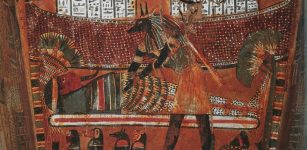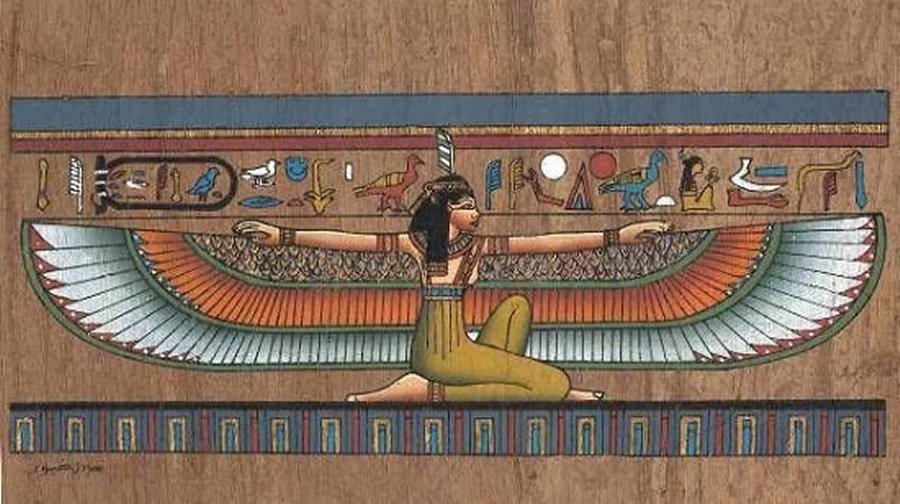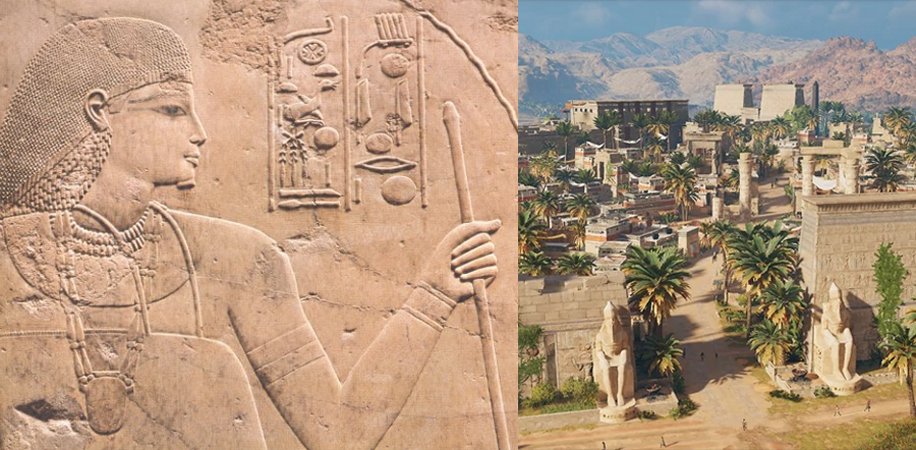Why Did Ancient Egyptians Fear The Vizier?
Ellen Lloyd - AncientPages.com - One would think twice before committing crimes in ancient Egypt. The punishments for breaking the law were severe and, in some cases, fatal.
Ancient Egyptians had many laws, and those who dared to interfere with the Cosmic Order – Maat had to pay a high price, but not with money. No person stood above the law. No one was special and could be allowed to misbehave.
Maat – Ancient Egypt’s Most Important Religious Concept - read more
Powerful nobles and officials could be punished just as quickly as farmers and pyramid builders.
Depending on the type of crime, a person risked drowning, mutilation, decapitation, or being burned alive.
Maat - The Cosmic Order Must Be Maintained
The Pharaoh was responsible for maintaining the Maat System, and this subject we discussed earlier on Ancient Pages.
Maat represented the essential religious concept of the Egyptian view of the world. It was a concept of order in the world that the gods, pharaohs, and ordinary people had to obey.
Maat was the Harmony or Law of the Universe. The lack of Maat and her departure meant an inevitable return to the original chaos (Nu) and the end of the known world.
Every Egyptian was responsible for maintaining the Cosmic Order.
The Vizier Was Respected And Feared
Next, after the Pharaoh, the vizier was the most influential person in ancient Egypt. As the highest state official, the vizier was the immediate subordinate of the king, responsible for legal matters, and thus feared by criminals.
The Pharaoh appointed the vizier, and he was usually one of the king's younger brothers. The duties of the vizier were defined in the Instruction of Rekhmire (Installation of the Vizier), a New Kingdom text.
All other lesser supervisors and officials, such as tax collectors and scribes, would report to the vizier. The vizier supervised Pharaoh's security guards and all soldiers who protected temples and palaces.
Left: Ramose was the Mayor of Thebes and Vizier of Upper Egypt during the later part of the reign of Amenhotep III and the early part of the reign of Amenhotep IV, who later became Akhenaten. - Credit: donf.com - Right: Artistic impression of Thebes - Credit: XOdeyssusx
The vizier was very powerful and appointed judges. The vizier was the one who defined the punishment for a serious crime. The vizier likely consulted the king concerning all difficult decisions. No one could receive a death sentence in ancient Egypt without the Pharaoh's express permission. The vizier was also not allowed to judge an official based on suspicion and charges without hearing his defense.
The worst prison in ancient Egypt was located in Thebes. Known as the Great Prison, this place served as a confinement and labor camp. In his book Duties of the Vizier, author G. P. F. Van Den Boorn writes, "its inmates included convicted criminals, people awaiting execution for capital crimes and corvée laborers." Statute labor is a corvée imposed by a state for public works. The last-mentioned were unpaid workers.
Ancient Egyptians were highly harsh when they discovered someone had interfered with the Maat system. Anyone who broke the law in Egypt feared the vizier, with good reason.
During the Fifth Dynasty (2,500 B.C. – 2,350 B.C.), Egyptian Vizier Ptahhotep, occasionally known as Ptahhotep I, Ptahhotpe, or Ptah-Hotep, wrote several instructions based on his wisdom and experiences.
His precious text contains advice on how to live your life, and much of what he wrote is still highly relevant today.
The Maxims of Ptahhotep influenced later philosophical works, and his work is one of the first Egyptian books.
Written by Ellen Lloyd – AncientPages.com
Updated on December 1, 2023
Copyright © AncientPages.com All rights reserved. This material may not be published, broadcast, rewritten or redistributed in whole or part without the express written permission of AncientPages.com
Expand for referencesMore From Ancient Pages
-
 Mysterious Ancient Inscription With Unknown Language Found Near Lake Bashplemi, Georgia
Linguistic Discoveries | Dec 4, 2024
Mysterious Ancient Inscription With Unknown Language Found Near Lake Bashplemi, Georgia
Linguistic Discoveries | Dec 4, 2024 -
 Scylla And Charybdis – Legendary Greek Sea Monsters – Choosing The Lesser Of Two Evils
Featured Stories | Jan 15, 2021
Scylla And Charybdis – Legendary Greek Sea Monsters – Choosing The Lesser Of Two Evils
Featured Stories | Jan 15, 2021 -
 Exploring Future Evolution: How Will Humans Change In The Next 10,000 Years?
Featured Stories | Oct 3, 2022
Exploring Future Evolution: How Will Humans Change In The Next 10,000 Years?
Featured Stories | Oct 3, 2022 -
 Sacred Helgafell Mountain And The Story Of Torolv Mostrarskjegg
Myths & Legends | Mar 13, 2024
Sacred Helgafell Mountain And The Story Of Torolv Mostrarskjegg
Myths & Legends | Mar 13, 2024 -
 Gargoyles – Mysterious Ancient Fearsome Creatures Warding Off Evil
Featured Stories | Nov 25, 2024
Gargoyles – Mysterious Ancient Fearsome Creatures Warding Off Evil
Featured Stories | Nov 25, 2024 -
 Monumental King’s Grave (Bredarör) In Kivik, Sweden With Spectacular Rock Carvings
Featured Stories | Sep 17, 2024
Monumental King’s Grave (Bredarör) In Kivik, Sweden With Spectacular Rock Carvings
Featured Stories | Sep 17, 2024 -
 On This Day In History: Vasco De Gama Departed On First European Voyage To India – On July 8, 1497
News | Jul 8, 2016
On This Day In History: Vasco De Gama Departed On First European Voyage To India – On July 8, 1497
News | Jul 8, 2016 -
 Illegal Journey Of 2,000 Historic Artifacts Hidden In Truck Under The Guise Of Parquet
Artifacts | Jan 3, 2021
Illegal Journey Of 2,000 Historic Artifacts Hidden In Truck Under The Guise Of Parquet
Artifacts | Jan 3, 2021 -
 Evolution Of Plague Over Hundreds Of Years In Scandinavia Documented By Scientists
Archaeology | Feb 28, 2023
Evolution Of Plague Over Hundreds Of Years In Scandinavia Documented By Scientists
Archaeology | Feb 28, 2023 -
 Oldest Evidence Of Maya Calendar Discovered In Guatemala
Archaeology | Feb 6, 2023
Oldest Evidence Of Maya Calendar Discovered In Guatemala
Archaeology | Feb 6, 2023 -
 Secret Ancient Knowledge Of Portals Leading To Unknown Realms -The Arrival And Departure – Part 1
Ancient Mysteries | Dec 1, 2021
Secret Ancient Knowledge Of Portals Leading To Unknown Realms -The Arrival And Departure – Part 1
Ancient Mysteries | Dec 1, 2021 -
 Unexpected Discovery – Medieval Monks Recorded Mysterious Volcanic Eruptions
News | Apr 6, 2023
Unexpected Discovery – Medieval Monks Recorded Mysterious Volcanic Eruptions
News | Apr 6, 2023 -
 Finds At Timna Valley Date Back To King Solomon-Era And Point To Sophisticated Ancient Society
Archaeology | Mar 3, 2017
Finds At Timna Valley Date Back To King Solomon-Era And Point To Sophisticated Ancient Society
Archaeology | Mar 3, 2017 -
 Remarkable Ancient High-Tech Genetic Disc Could Re-Write Ancient History
Artifacts | Sep 15, 2014
Remarkable Ancient High-Tech Genetic Disc Could Re-Write Ancient History
Artifacts | Sep 15, 2014 -
 Mysterious Ancient Grave With Unusual Artifacts That Belonged To A Völva – Norse Female Shamans Did Exist
Featured Stories | Jul 2, 2017
Mysterious Ancient Grave With Unusual Artifacts That Belonged To A Völva – Norse Female Shamans Did Exist
Featured Stories | Jul 2, 2017 -
 Victory Tower – An Imposing Victory Monument In Chittorgarh, Rajasthan, India
Civilizations | Jul 28, 2015
Victory Tower – An Imposing Victory Monument In Chittorgarh, Rajasthan, India
Civilizations | Jul 28, 2015 -
 Immortal God Anubis: Lord Of The Sacred Land, Jackal God Of Mummification
Egyptian Mythology | Sep 19, 2016
Immortal God Anubis: Lord Of The Sacred Land, Jackal God Of Mummification
Egyptian Mythology | Sep 19, 2016 -
 DNA Study Of Controversial Ancient North American Mummies, Including The Spirit Cave Mummy Opens An Extraordinary Chapter In Human History
Archaeology | Nov 15, 2018
DNA Study Of Controversial Ancient North American Mummies, Including The Spirit Cave Mummy Opens An Extraordinary Chapter In Human History
Archaeology | Nov 15, 2018 -
 Traditional Viking-Age Crafts: Glass Beadmakers And Their Secrets
Archaeology | Oct 4, 2022
Traditional Viking-Age Crafts: Glass Beadmakers And Their Secrets
Archaeology | Oct 4, 2022 -
 Rare Pre-Columbian Archaic Settlement Discovered In The Dominican Republic May Solve A Caribbean Mystery
Archaeology | Apr 12, 2022
Rare Pre-Columbian Archaic Settlement Discovered In The Dominican Republic May Solve A Caribbean Mystery
Archaeology | Apr 12, 2022


